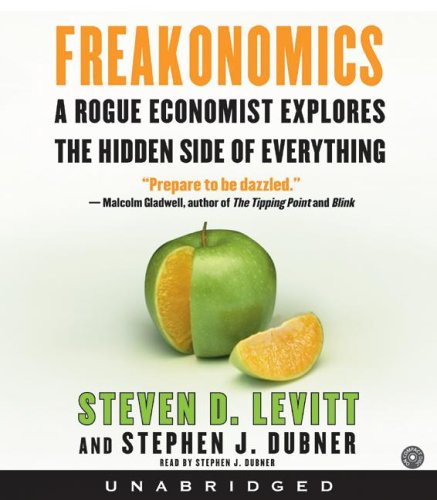
Freakonomics
A Rogue Economist Explores the Hidden Side of Everything
فرمت کتاب
audiobook
تاریخ انتشار
2005
نویسنده
Stephen J. Dubnerناشر
HarperCollinsشابک
9780060842963
کتاب های مرتبط
- اطلاعات
- نقد و بررسی
- دیدگاه کاربران
نقد و بررسی

According to economist Levitt and writer Dubner, everything--including the cheating habits of Sumo wrestlers, the choice of baby names, the finances of crack dealers, or the likelihood of bagel theft--can be decoded if we study the numbers. Using a freewheeling narrative style that jumps from one cultural phenomenon to another, FREAKONOMICS takes on conventional wisdom. (No, apparently it doesn't help much if you read to your child, and, yes, even Harvard graduates from good families can become serial killers.) There's no unified field theory here, but there is a message behind the medium: Don't trust the experts. Co-author Dubner reads in a friendly, instructive style that captures the enthusiasm of the authors. This is especially recommended for those who liked the books of Malcolm Gladwell or James Surowiecki's THE WISDOM OF CROWDS. R.W.S. (c) AudioFile 2005, Portland, Maine

Starred review from March 14, 2005
Forget your image of an economist as a crusty professor worried about fluctuating interest rates: Levitt focuses his attention on more intimate real-world issues, like whether reading to your baby will make her a better student. Recognition by fellow economists as one of the best young minds in his field led to a profile in the New York Times
, written by Dubner, and that original article serves as a broad outline for an expanded look at Levitt's search for the hidden incentives behind all sorts of behavior. There isn't really a grand theory of everything here, except perhaps the suggestion that self-styled experts have a vested interest in promoting conventional wisdom even when it's wrong. Instead, Dubner and Levitt deconstruct everything from the organizational structure of drug-dealing gangs to baby-naming patterns. While some chapters might seem frivolous, others touch on more serious issues, including a detailed look at Levitt's controversial linkage between the legalization of abortion and a reduced crime rate two decades later. Underlying all these research subjects is a belief that complex phenomena can be understood if we find the right perspective. Levitt has a knack for making that principle relevant to our daily lives, which could make this book a hit. Malcolm Gladwell blurbs that Levitt "has the most interesting mind in America," an invitation Gladwell's own substantial fan base will find hard to resist. 50-city radio campaign.

September 1, 2005
Economist Levitt and Dubner ("Turbulent Souls") team up in this intriguing, quirky look at life and how to understand better the world in a new way. In 2003, the "New York Times" "Magazine" sent Dubner to do a profile of Levitt, and the idea for this book was born. Levitt looks at a variety of data, including KKK membership rolls, online dating services, and names for children, and finds in the math underlying answers to difficult questions that have a freakish quality. The quirky chapters include the commonality between schoolteachers and sumo wrestlers, why drug dealers still live with their mothers, and what makes a perfect parent. The crisp, bright narration by Dubner enlivens this title, which will appeal to fans of Malcolm Gladwell's "The Tipping Point" as well as to economists. Recommended for university libraries supporting a business and economics curriculum and larger public libraries. -Dale Farris, Groves, TX
Copyright 2005 Library Journal, LLC Used with permission.

























دیدگاه کاربران